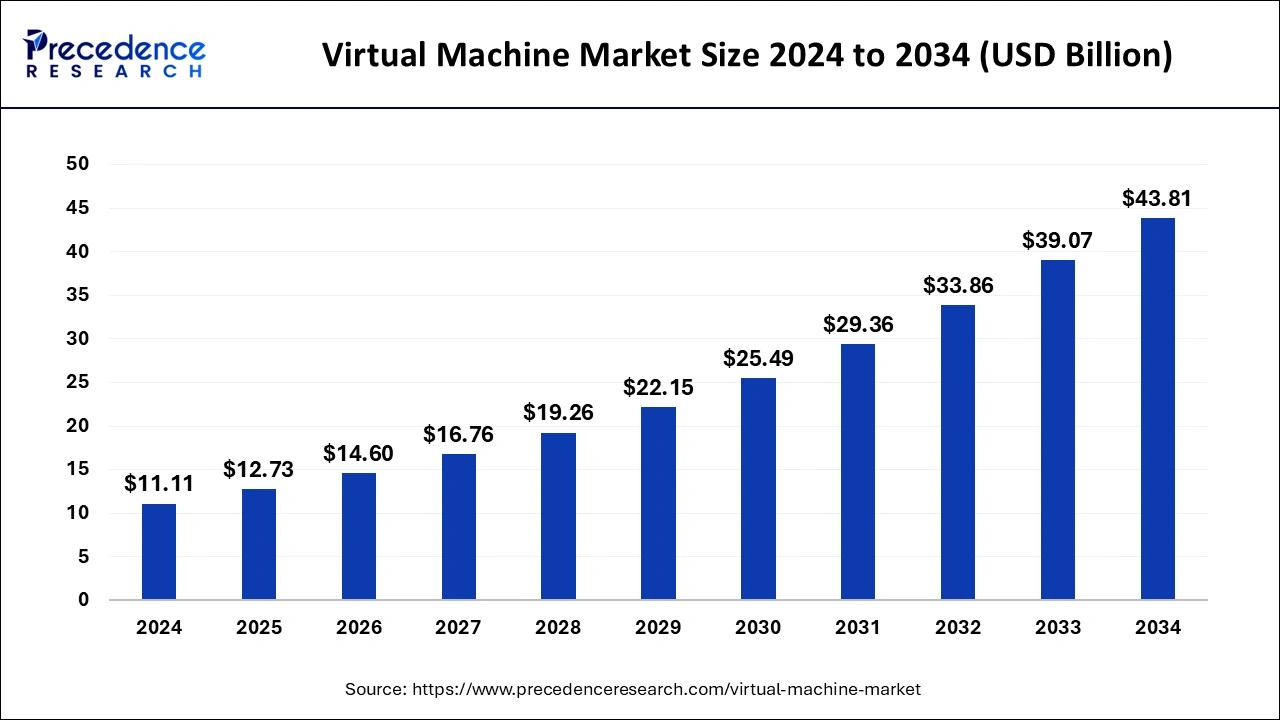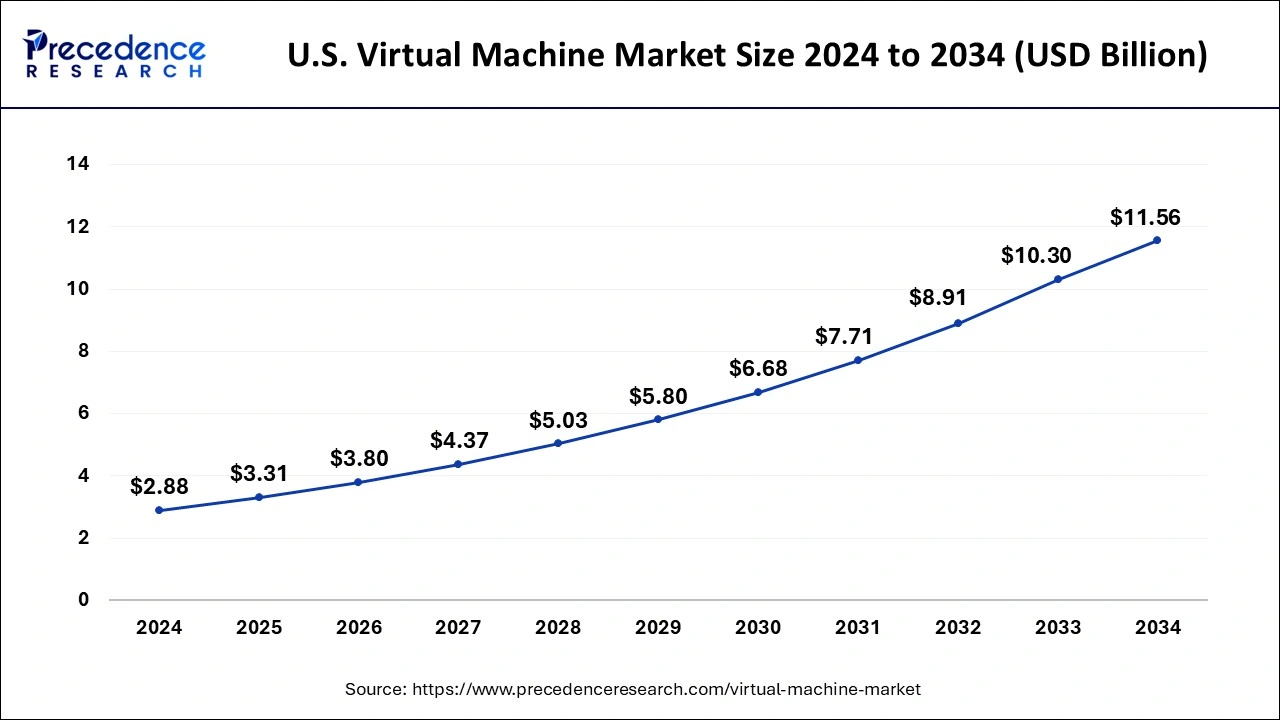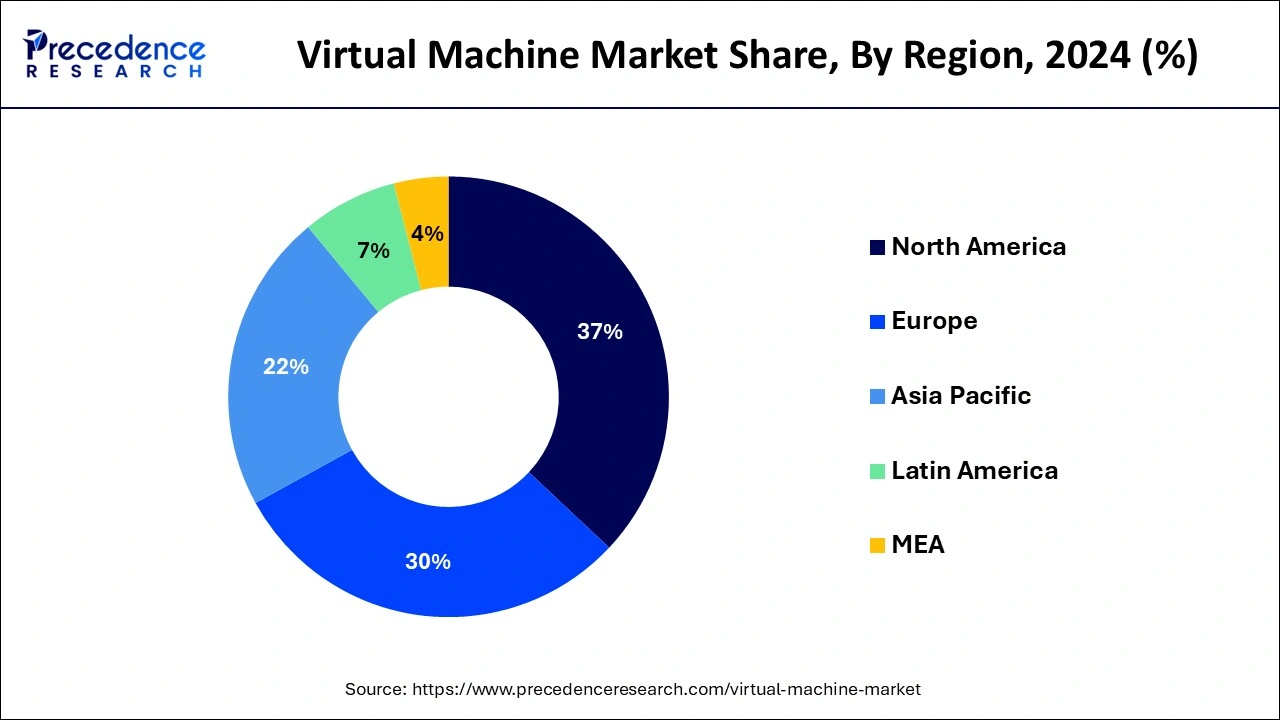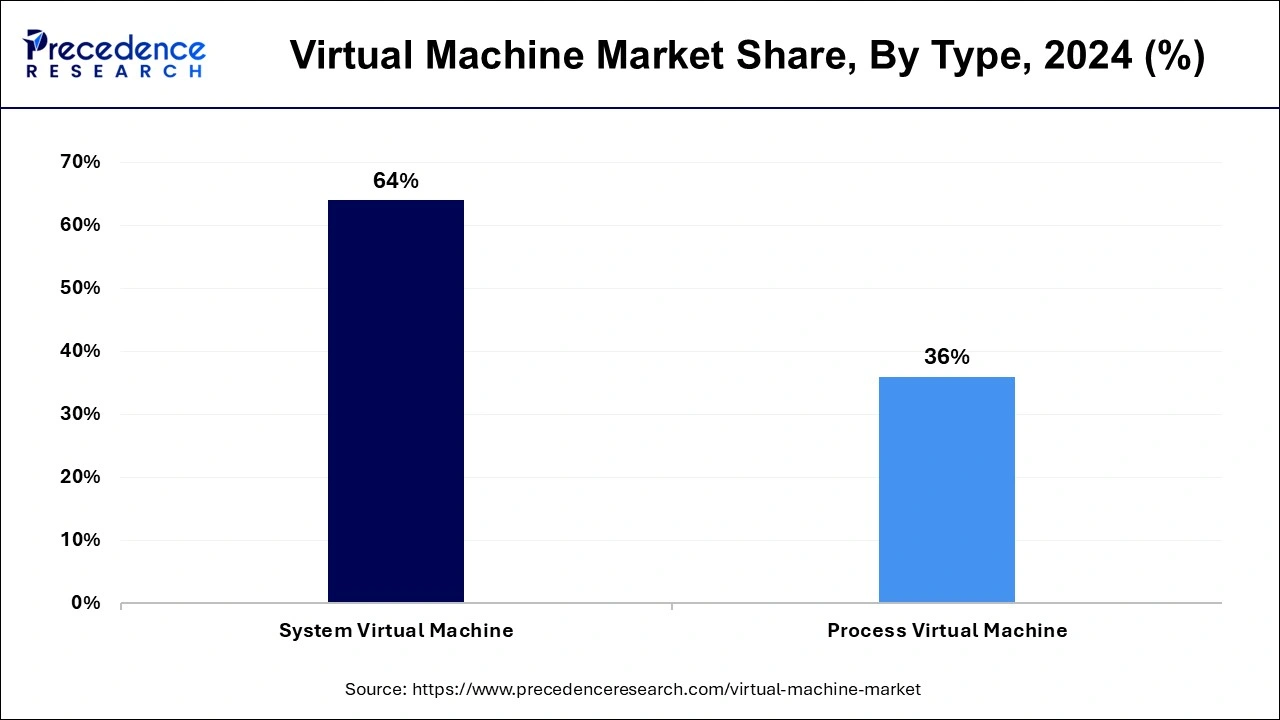November 2024
The global virtual machine market size is calculated at USD 12.73 billion in 2025 and is forecasted to reach around USD 43.81 billion by 2034, accelerating at a CAGR of 14.71% from 2025 to 2034. The North America market size surpassed USD 4.11 billion in 2024 and is expanding at a CAGR of 14.75% during the forecast period. The market sizing and forecasts are revenue-based (USD Million/Billion), with 2024 as the base year.
The global virtual machine market size accounted for USD 11.11 billion in 2024 and is predicted to increase from USD 12.73 billion in 2025 to approximately USD 43.81 billion by 2034, expanding at a CAGR of 14.71% from 2025 to 2034.

The U.S. virtual machine market size was evaluated at USD 2.88 billion in 2024 and is projected to be worth around USD 11.56 billion by 2034, growing at a CAGR of 14.91% from 2025 to 2034.

In 2024, North America held a share of 37% in the virtual machine market due to robust technological infrastructure, high IT spending, and widespread adoption of cloud computing. The region's advanced business ecosystem emphasizes efficiency through virtualization, driving the demand for virtual machines. Additionally, the presence of key industry players and early adoption of cutting-edge technologies contribute to North America's major market share. The region's proactive approach towards digital transformation, coupled with a mature IT landscape, positions it at the forefront of virtual machine adoption and innovation.

Asia-Pacific is projected to witness rapid growth in the virtual machine market due to increasing digital transformation initiatives, expanding cloud adoption, and a burgeoning IT landscape. Governments and businesses in the region are embracing virtualization technologies for enhanced scalability, flexibility, and cost-effectiveness. The rise of remote work and the need for efficient data management further contribute to the surge in demand for virtual machines. As the Asia-Pacific region continues to prioritize technological advancements, the virtual machine market is set to experience substantial expansion, driven by a dynamic and evolving digital ecosystem.
Meanwhile, Europe is witnessing notable growth in the virtual machine market due to increased emphasis on digital transformation, remote work, and efficient IT infrastructure. Organizations in the region are adopting virtualization technologies to enhance flexibility, optimize resource utilization, and improve overall business continuity. The push for cloud adoption, coupled with the rising demand for secure and scalable computing solutions, has driven the expansion of the virtual machine market in Europe, reflecting a broader trend of technological advancement and modernization across various industries in the region.
A virtual machine (VM) is a software-based emulation of a physical computer, allowing multiple operating systems to run on a single physical machine. It operates as an isolated environment, encapsulating the entire computing system, including the operating system, applications, and hardware components. This emulation enables users to run diverse software and perform various tasks on a single device, promoting resource efficiency and flexibility. VMs are commonly used for testing, development, and server consolidation. They provide a secure and scalable way to run multiple operating systems on a single piece of hardware, reducing the need for additional physical machines. Virtualization technology has become integral in modern computing, enabling more efficient resource utilization, and facilitating the deployment and management of diverse computing environments.
Virtual Machine Market Data and Statistics
| Report Coverage | Details |
| Growth Rate from 2025 to 2034 | CAGR of 14.71% |
| Market Size in 2025 | USD 12.73 Billion |
| Market Size by 2034 | USD 43.81 Billion |
| Base Year | 2024 |
| Forecast Period | 2025 to 2034 |
| Segments Covered | Type, Organization Size, and Vertical |
| Regions Covered | North America, Europe, Asia-Pacific, Latin America, and Middle East & Africa |
Rise in remote work
The surge in remote work has significantly boosted the demand for virtual machines (VMs) as organizations seek flexible and accessible computing solutions. With employees working from diverse locations, VMs enable seamless access to centralized computing resources, allowing individuals to connect to a virtual desktop or server securely. This newfound reliance on remote work has accelerated the adoption of virtualization technologies, ensuring that employees can efficiently collaborate and access critical applications and data regardless of their physical location.
Virtual machines facilitate remote work by providing a virtualized environment that mirrors the functionalities of a physical computer. This not only enhances employee productivity but also streamlines IT management by centralizing resources. As businesses prioritize remote-friendly infrastructure, the virtual machine market continues to grow, offering a scalable and efficient solution to support the evolving landscape of modern work arrangements.
Complexity and skill gap
The complexity associated with implementing and managing virtual machines (VMs) poses a restraint on the market demand. Setting up virtualization solutions requires specialized skills, and many organizations face challenges in finding professionals with the expertise to design and maintain virtualized environments. The intricacies of VM deployment, configuration, and troubleshooting can be overwhelming for businesses, particularly smaller ones lacking the resources for dedicated IT staff with the required skill set.
The skill gap exacerbates the complexity issue, making it difficult for organizations to fully harness the benefits of virtualization. Limited access to knowledgeable personnel can result in suboptimal implementation, potential security vulnerabilities, and slower issue resolution. As a result, the market demand for virtual machines may be constrained by the barriers posed by the complexity of virtualization technologies and the shortage of skilled professionals needed to navigate these complexities effectively. Efforts to simplify virtualization processes and provide accessible training can help address this challenge and promote broader adoption.
Edge computing integration
Edge computing integration is opening significant opportunities for the virtual machine (VM) market. As computing resources move closer to the edge of the network, VMs provide a scalable and flexible solution for managing workloads in distributed environments. This shift allows businesses to deploy VMs at the edge to process data locally, reducing latency and enhancing the overall performance of applications and services. VMs in edge computing enable the creation of dynamic and efficient computing environments, supporting real-time processing requirements.
This integration is particularly valuable in scenarios where low-latency and high-throughput are critical, such as in IoT (Internet of Things) applications and edge-based analytics. The ability of VMs to provide isolation, security, and easy management in edge computing environments positions them as a key technology for businesses looking to harness the benefits of distributed computing and capitalize on emerging opportunities in the evolving landscape of IT infrastructure.
The system virtual machine segment held the highest market share of 64% in 2024. System virtual machine, a key segment in the virtual machine market, refers to the emulation of an entire computer system. It enables the execution of multiple operating systems on a single physical machine, enhancing resource efficiency. A trend in this segment involves the rising demand for system virtual machines in cloud computing environments. As businesses increasingly adopt cloud services, the need for efficient system-level virtualization grows, allowing seamless management of diverse operating systems within a shared infrastructure, and promoting scalability and cost-effectiveness.

The process virtual machine segment is anticipated to grow rapidly at a significant CAGR of 16.12% during the projected period. Process virtual machines are a type of virtualization technology that allows the execution of individual processes or applications in isolated environments. This segment of the virtual machine market is characterized by its efficiency in running specific tasks independently, enhancing resource utilization and security. A notable trend in process virtual machines involves their integration into containerization technologies, such as Docker, contributing to the broader movement towards lightweight and scalable application deployment. This trend emphasizes the importance of process virtual machines in modern, agile software development practices and microservices architectures.
The SMEs segment has held 73% market share in 2024. Small and medium-sized enterprises (SMEs) in the virtual machine market typically refer to businesses with a limited number of employees and resources. In recent trends, SMEs are increasingly adopting virtual machines to streamline IT infrastructure, enhance flexibility, and reduce costs. Virtualization allows SMEs to run multiple operating systems and applications on a single server, optimizing resource utilization. This trend aligns with the growing recognition among SMEs of the efficiency gains and scalability offered by virtual machines, contributing to their technological advancement and competitiveness.
The large enterprises segment is anticipated to grow rapidly over the projected period. In the virtual machine market, large enterprises represent organizations with extensive infrastructure needs. These companies typically deploy virtual machines to achieve efficient resource utilization, scalability, and cost savings. Trends in this segment include a growing emphasis on hybrid cloud solutions, where large enterprises leverage a combination of on-premises and cloud-based virtualization to enhance flexibility. Additionally, there's a focus on advanced security features and comprehensive management tools to meet the complex requirements of sizable IT environments within large enterprises.
The BFSI segment has held a 27% market share in 2024 In the BFSI (Banking, Financial Services, and Insurance) segment, virtual machines (VMs) are pivotal for optimizing IT infrastructure. VMs enable secure and efficient operations, allowing financial institutions to manage vast amounts of data and applications. The trend in the BFSI sector involves an increased adoption of VMs to enhance scalability, improve resource utilization, and strengthen data security. As financial services increasingly rely on digital platforms, the virtual machine market in the BFSI vertical is poised to witness sustained growth, driven by the need for agile and resilient IT solutions in this dynamic industry.
The government & public segment is anticipated to grow rapidly over the projected period. The government and public sector vertical in the virtual machine market encompasses public institutions and agencies that leverage virtualization technologies for streamlined operations. Trends indicate a growing adoption of virtual machines for enhanced data security, cost efficiency, and scalable IT infrastructures. Governments worldwide are increasingly deploying virtualization solutions to optimize resource utilization, improve service delivery, and ensure the robustness of critical public services, reflecting a broader trend of leveraging virtual machines to meet the unique demands of the public sector.
By Type
By Organization Size
By Vertical
By Geography
For inquiries regarding discounts, bulk purchases, or customization requests, please contact us at sales@precedenceresearch.com
No cookie-cutter, only authentic analysis – take the 1st step to become a Precedence Research client
November 2024
November 2024
January 2025
November 2024